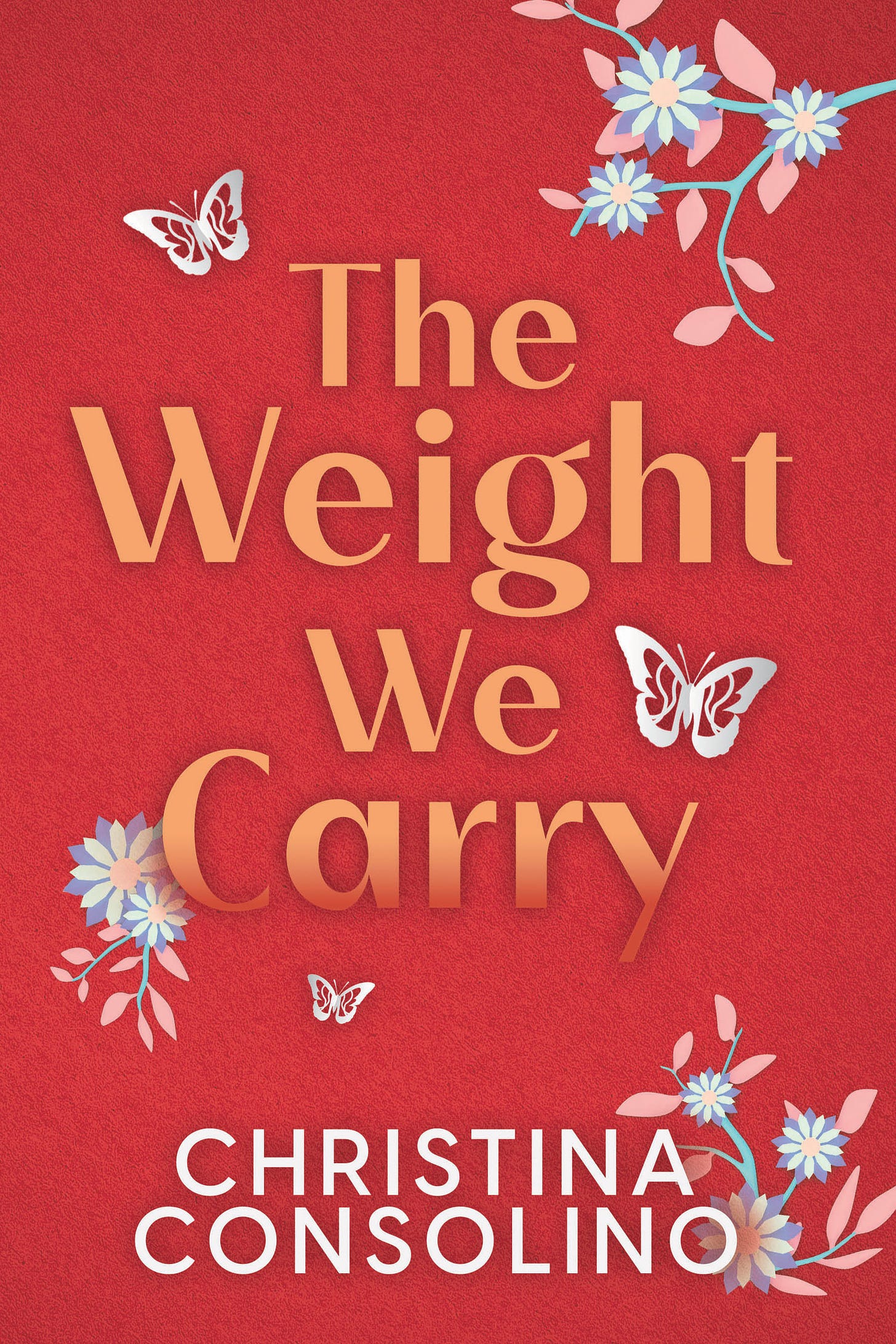"though my writing time decreased, my imagination bloomed"
a good creatures interview with novelist Christina Consolino about being present for both writing and caregiving, and making sure your family sees the joy in your creative work
Hello there! This is an entry in a new section, good creatures, that explores the intersection of caregiving and creative practice. I’m so excited to showcase people doing lots of kinds of caregiving—people caring for kids or pets or other family members and/or caring for space through gardening or community work or activism—and lots of kinds of creative work.
If you know (or are!) a good creature whose work we should feature, send me an email—you can just reply to this newsletter.
Today’s interview is with Christina Consolino, who is the author of the new book The Weight We Carry, about a middle daughter struggling to balance caring for her own children with navigating her parents’ increasingly complex health care needs. It’s a great book about the challenges and joys of family life, and I especially liked how candid and unsentimental it was about aging parents. (It’s not a spoiler, I don’t think, to say that the dad, Frank, is kind of a pain in the butt, but you end up rooting for everyone anyway!) In an author’s note in the back, Christina wrote a bit about her own mother’s dementia and how she’d wanted to write a book about the really challenging part of that journey, when you know that something is going wrong but you don’t yet have a diagnosis. It’s a really beautiful book, and if you or someone you know are finding yourselves in that sandwich generation of caring for kids and parents, I think it will provide some comfort, or perhaps companionship along the way.
Below, we talk about how parenting inspired Christina’s writing practice, maintaining a writing life through the complex demands of caring for aging parents, and refusing not to write.
Who do you care for?
We have four children (three of whom are now in college, two of whom are identical twins) and four pets. My parents moved to live a half mile away from me in late 2019, after which time I took on some caregiving responsibilities for them (my mother passed away from Alzheimer’s in October 2022). While I’m visiting my dad at the memory-care facility, I care for the other residents, and during the week, I care for my students too.
What kind of creative work do you do?
Writing and editing. Book club/women’s fiction under my own name and romance under a pen name, and I freelance edit both fiction and nonfiction. I also conduct author interviews for a blog series on my website, and I serve as a sounding board for my youngest, who is already a writer.
What’s changed in your creative life since becoming a caregiver?
Writing has always been a passion of mine, but my practice really took off after I had children (almost counterintuitive, you know?). Parenting can be exhausting at times, but it can also be inspiring. Watching my children grow and mature, question the universe and me, and discover new ideas and concepts sparked ideas inside my head. Moreover, I wanted to serve as a role model for my children; since publishing a book (or more) was on my list of dreams, I went for it, and I hope they aren’t afraid of tackling their own dreams.
The same thing happened with respect to caregiving for my parents. Though my writing time decreased, my imagination bloomed, and here I am, four published novels later and writing more.
What’s an adjustment you’ve had to make to your creative process, and an adjustment you refuse to make?
Once my mom was diagnosed with Alzheimer’s, my writing time dwindled, so I had to adjust my approach. That’s when I decided to write in 15-minute bursts. Regardless of what’s happening in my life at the time, I can usually find 15 minutes to do some writing. On good days, I get in a number of 15-minute chunks. On some days, it’s only one. Slow and steady wins the race though, right?
I absolutely refuse to not write, so my computer or Chromebook or paper notebook goes with me everywhere. I’ve written in ER bays, doctor’s offices, auto repair lobbies, the car (when someone else is driving!), my mom’s room, the dining room at the memory care facility, and more.
What have you given up or done less of or outsourced to make space for your creative work?
When I was a kid, the family cleaned the house on Saturday mornings. Someone dusted, another vacuumed. We’d do the kitchen, the bathrooms, you name it. Despite our four kids (and maybe a little bit because of), whole-house cleaning is not on the list of items that get accomplished on the regular. With four animals, we vacuum at least once a week, but everything else gets cleaned as needed. (Fear not, visitors! We always do a whole-house cleaning before guests arrive, and I can always guarantee clean sheets, towels, and a wiped-down kitchen and bathroom!)
I also do less socializing. I’m an introvert, and my energy is zapped by any size crowd anyway—and as I get older, it takes longer to recharge—so I’m fine with leaving much of my social life behind. When I do socialize, it’s usually one-on-one with someone who matters to me.
How do you balance creative practice with care-giving?
I’m not sure I balance the two very well, meaning much of the time, the balance is tipped in one direction or another, but overall, both my creative practice and care-giving get accomplished. For me, the key ingredient is a schedule. I’ve been getting up before the sun does since the kids were little; it’s much easier to capture my creativity when the house is quiet, my brain is fresh, and my attention is focused on my work. That practice still continues today, even though my youngest is fifteen. In addition, my family understands how much joy my creative practice gives to me, and they respect my time pretty well.
Now that my kids are older, care-giving comes later in the day, when the youngest is home from school or I go see my dad, and because I feel like a different part of my brain is used for caregiving, everything seems to work out.
I have learned that the best thing I can do for both my creative practice and care-giving is be present in the moment. Even if I only have 15 minutes to write, if I’m focused, I get a lot done. If I’m helping my dad for 15 minutes, I need to be thinking about him and only him, not what’s happening in my book. The same goes for my kids. Being present allows me to soak up the actual moment, make lasting memories, and keep learning and growing while helping someone else.
What advice would you give someone who has a creative practice and is embarking on becoming a caregiver?
Be selfish at times. That might sound odd, but care-giving takes a lot out of a person, and if you’re putting all your energy into care-giving, you won’t have anything left for you and your own pursuits. So, the creative practice needs to be high on the priority list, or you’ll find other ways to fill the time.
Christina Consolino is the author of The Weight We Carry and Rewrite the Stars, and the co-author of Historic Photos of University of Michigan. She also writes romance under the pen name Keely Stephens. Along with teaching, she freelance edits both fiction and nonfiction. Warm cups of coffee, good books, and long runs outside are some of her favorite things, and if she had her way, our days would be filled with nothing but joy.
You can find Christina on instagram at cmconsolino, on facebook at AuthorChristinaConsolino, and on Goodreads as Christina Consolino. You can read more at her website.
Write More, Be Less Careful is a newsletter about why writing is hard & how to do it anyway. You can find my books here and read other recent writing here. If you’d like occasional dog photos, glimpses of my walks around town, and writing process snapshots, find me on instagram.
If Write More has helped you in your creative life, I’d love it if you would share it with a friend.







I needed this medicine so much. Thank you thank you for sharing it. 💓🙏🏻
I love the line “I absolutely refuse not to write” and want to remember that as an appeal to my contrary, stubborn side (especially when I am exhausted by all the non-writing).